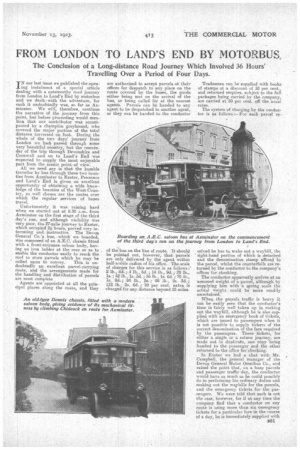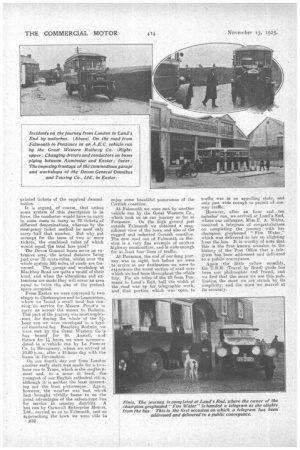FROM LONDON TO LAND'S END BY MOTORBUS,
Page 43

Page 44

If you've noticed an error in this article please click here to report it so we can fix it.
The Conclusion of a Long-distance Road Journey Which Involved 36 Hours' Travelling Over a Period of Four Days.
TN our last issue we published the openling instalment of a special article dealing with a noteworthy road journey Lem London to Land's End by motorbus and we dealt with the adventure, for such it undoubtedly was, so far as Axminster. We will, therefore, continue the narrative of the journey from this _point, but before proceeding would mention that our oontributor wars accompanied by a champion greyhound, who covered the major portion of the total distance traversed on foot. During the whole of the two days' journey from London we had passed through some veryheautiful country, but the remainder of the trip through Devonshire and Cornwall and on to Land's End was expected to supply the most enjoyable part from the scenic point-of view.
All we need say is that the humble traveller by bus through these two bounties from Axminster to Exeter, Penzance and Land's End is given an excellent opportunity of obtaining a wide knowledge of the beauties of the West Country, so' well chosen are the routes over which the regular services of buses travel.
Unfortunately it was raining hard when we started out at 8.30 a.m. from Axminster on the first stage of the third day's run, and although visibility was very poor, the 27-mile journey to Exeter, which occupied 4 hours, proved very interesting terestin and. instructive. The Devon General' Co.'s bus, whichwe boarded, tOas composed of an A.E.C. chassis fitted with a front-entrance saloon body, having an iron ladder at the rear so as to enable the conductor easily to reach the roof to store parcels. which he may be ' called upon to convey. This is undoubtedly an excellent parcel-carrying route, and the arrangements made for the handling and distribution of parcels are most complete.
Agents are appointed at all the principal places along the route, and they are authorized to accept parcels at their offices for despatch to any place on the route covered by the buses, the goods eitherbeing met on the arrival of the bus, or being called for at the nearest agents. Parcels can be handed to any agent to be despatched to another agent, or they can be handed Ao the conductor
of the bus on the line of route. It should be pointad out, however, that parcels are only delivered bY the agent within half-a-mile radius of his Office. The scale of charges for this service is as follows: 2 lb., 4d. ;'4 lb., 6d. ; 14 lb., 9d..,; 28 lb., is.; 42 lb., ls. 3d.; 56 lb., is. 6d.; 70 lb., Is. 9d.; 84 lb., 2s..; 98 lb., 2s. 3d. ; 112.1b.' 2s. 6d. ; 10 per cent. extra is charged, for any distance beyond 25 miles.
Tradesmen can be supplied with books of stamps at a discount of 10 per cent., and returned empties, subject to the full packages being carried by the company, are carried at 50 per cent. off the, usual rates.
The system of -Charging by the conductor is as follows :—.For each parcel re• ceived he has to make out a waybill, the right-hand portion of Which is detached and the denomination stamp affixed to the parcel, whilst the counterfoils are returned by the conductor to the company's offices for checking.
The conductor apparently arrives at an assumed weight of a parcel, although by supplying him with a spring scale the actual weight could be more readily ascertained.
When the pal:eels traffic is heavy it can be easily seen that the conductor's time i fairly well taken up in making i out the waybill, although he s also supplied with an emergency book of tickets, which are issued to passengers when it is not possible to supply tickets of the correct denomination of the fare required by 'the passengers. These tickets, for either a single or a return journey, are made out in duplicate, one copy being handed to the passenger and the other returned to the.office for checking.
In Exeter we had a chat with Mr. Campbell, the general manager of the Devon General Motor 'Omnibus Co., and raised the point that, on a busy parcels and passenger traffic day, the conductor would have as much as be could possibly do in performing his ordinary duties and making out the waybills for the parcels, and the emergency tickets for the passengers. We were told that such is not, the case, however, for if at any time the company find that a conductor on any route is using more than six emergency tickets for a particular fare in the course of a day, he is immediately supplied with
printed tickets of the required denomination.
It is argued, of course, that unless some system of this description is in force, the conductor would have to carry in some cases as many as 72 tickets of different denominations, whereas by the emergency ticket method he need only carry half that number. • But why not arrange for the issue of two or more tickets, the combined value lof which would equal the total fare paid? The Devon General buses serve an extensive area, the actual distance being just over 70 route-miles, whilst over the whole system 300 miles of roads are traversed. The garage and workshop at Blackboy Road are quite a model of their kind, and when the alterations and extensions are made they will cover an ares equal to twice the size of the present space occupied.
Film Exeter we were conveyed in two stages to Okehampton and to Launceston, where we found a small local bus running on service for Messrs. Prout's carry us across the • moors to Bodmiir. This part of the journey was most unpleasant, for during the whole of the hour run we were enveloped in a typical moorland tog. Reaching Bodrnin, ,ve were met by the Great Western Co 's bus bound for St. Austell, a:id thence for IA hours we were accomuodated in a vehicle rim by La Pretner Co. to Mevagissey, where we arrived at 10.30 p.m., after a 14-hour day with the buses in Devonshire.
On our fourth day out from London another early start was made for a twohour run to Truro, which is the southernmost and, in a sense at least, the youngest of our English cathedral citiss, although it is, neither the least interesting nor the least picturesque. Again,
however, the weather was bad, wh'ch fact brought vividly home to us the great advantages of the saloon-type Luis
for service in country districts. A bus run by Cornwall Enterprise Matra, Ltd., carried us on to Falmouth, and on approaching the town' we were able to
B52 enjoy some beautiful panoramas of the Cornish coastline.
At Falmouth we were met by another vehicle run by the Great Western Co., which took us on our journey so far as Penzance. On the high ground just outside Falmouth we obtained a magnificent view of the town and also of the rugged and indented Cornish coastline. The new road out of Falmouth to Heist-on is a very fine example of modern highway construction, and is wide enough for at least four lines of traffic.
At Penzance, the end of our•long journey was in sight, but before we were to arrive at our destination we were to experience the worst section of road over which we had been throughout the whole hip. For six miles of the 12 from Penzance to Land's End, half Die width of the road was up for telegraphic work, and that portion which was open to traffic was in an appalling state, and only just wide enough to permit of oneway traffic.
However, after an horn: and ten minutes' run, we arrived at Land'sEnd, where our colleague, Miss F. A. White, received a telegram of :congratulations on completing the journey with her champion greyhound "Fire Water," which was delivered to her on alighting from the.,Inis. It is worthy of note that this is the first known occasion in the history of the Post Office that a telegram has been addressed and delivered to a public conveyance.
Again the little yellow monthly, the T.B.A. gravel by Road) guide has been our philosopher and friend, and we find that the more we use this publication the more we are struck by its simplicity; and the more we marvel at its accuracy.
















































